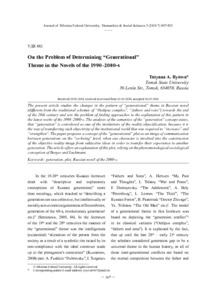On the Problem of Determining “Generational” Theme in the Novels of the 1990–2000-s
Скачать файл:
URI (для ссылок/цитирований):
https://elib.sfu-kras.ru/handle/2311/10365Автор:
Rytova, Tatyana А.
Рытова, Т.А.
Дата:
2014-05Аннотация:
The present article studies the changes in the pattern of “generational” theme in Russian novel
(different from the traditional schemes of “Oedipus complex”, “ fathers and sons”) towards the end
of the 20th century and sets the problem of finding approaches to the explanation of this pattern in
the latest works of the 1990–2000-s. The analysis of the semantics of the “generation” concept states,
that “generation” is considered as one of the institutions of the reality objectification, because it is
the way of transferring such objectivity of the institutional world that was required to “increase” and
“strengthen”. The paper proposes a concept of the “generational” plot as an image of communication
between generations on the “co-being” level, when one character is involved into the construction
of the objective reality image from subjective ideas in order to transfer their experience to another
generation. The article offers an explanation of this plot, relying on the phenomenological sociological
conception of Berger and Luckmann В статье рассматривается изменение к концу XX века схемы событий “поколенческого”
сюжета в русском романе (не в соответствии с традиционными схемами – “Эдипов комплекс”,
“отцы и дети”) и ставится проблема поиска подходов к объяснению этой схемы в новейших
произведениях 1990–2000-х гг. В результате анализа семантики понятия “поколение”
констатируется, что “поколение” считают одним из институтов объективации реальности,
потому что именно для передачи новому поколению объективность институционального мира
необходимо “увеличить” и “укрепить”. В статье предлагается понимание “поколенческого”
сюжета как изображения коммуникации поколений на уровне “со‑бытия”, когда герой ради
передачи своего опыта другому поколению включается в конструирование образа объективной
реальности из субъективных идей. В статье предлагается объяснение этого сюжета с опорой
на феноменологическую социологическую концепцию П. Бергера и Т. Лукмана
Коллекции:
Метаданные:
Показать полную информациюСвязанные материалы
Показаны похожие ресурсы по названию, автору или тематике.
-
The Dynamics of Innovative Susceptibility of the Siberian Federal District Regions in the Context of the Russian Federation Innovation Development Rating in 2000-2013
Vladimirova, Olga N.; Malakhovskaya, Marina V.; Владимирова, О.Н.; Малаховская, М.В. (Сибирский федеральный университет. Siberian Federal University., 2016-11)There is no alternative to the innovative way of competitive stability in the open economy. Susceptibility to innovation becomes an indicator of motivation and an essential factor in the economic system growth. The ... -
The Birth Rate of the Townsfolk of Krasnoyarsk Territory in the Context of All-Russian Demographic Trends (1990th-2000th)
Slavina, Ludmila N.; Tolmacheva, Anna V.; Л.Н.Славина; А.В.Толмачева (Сибирский федеральный университет. Siberian Federal University., 2009-11)In the article the main trends of the birth rate development in post-soviet period in Russia are considered on example of the town population Krasnoyarsk territory, we also try to give characteristics of the changes in ... -
НЕКОТОРЫЕ АСПЕКТЫ СТАНОВЛЕНИЯ КУЛЬТУРЫ СИБИРИ В 1990-2000Х ГГ. НА ПРИМЕРЕ АЧИНСКОГО ДРАМАТИЧЕСКОГО ТЕАТРА ИМЕНИ М.Ю.ЛЕРМОНТОВА
Барышев, Р. А. (Сибирский федеральный университет, 2011) -
ИСТОРИЯ РАЗВИТИЯ ИНДИ-РОКА (1980 – 2000-Е Г.Г.)
Мажукин, И. И. (Сибирский федеральный университет, 2013) -
Topics of doctoral and postdoctoral dissertations devoted to judo in period 2000-2016 – the overall analysis of works of Russian experts
Osipov, Aleksander; Kudryavtsev, Mikhail; Iermakov, Sergey; Jagello, Wladyslaw (2017-01)Background and Study Aim: The part of specialists think that the accumulated wide scientific knowledge of judo has not become the object of profound scientific analysis. Growth of judo popularity in the world (mainly in ...

